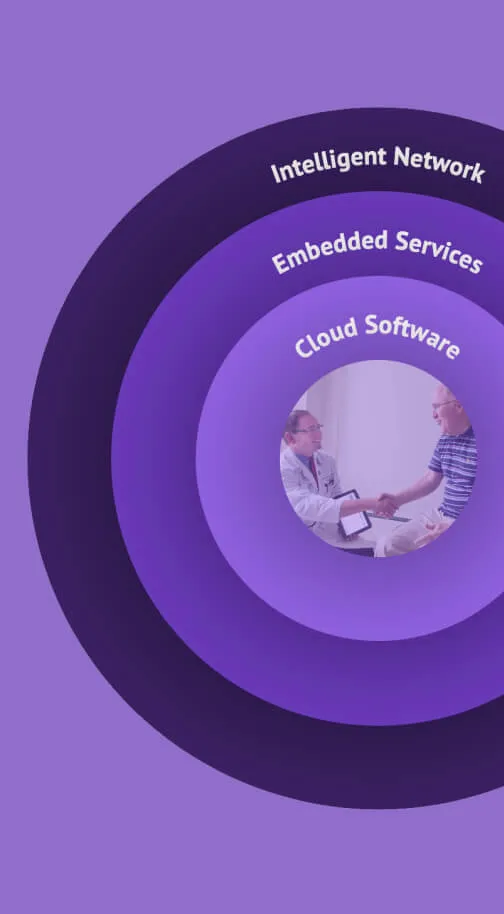Could AI in healthcare be the key to reducing clinician burnout?
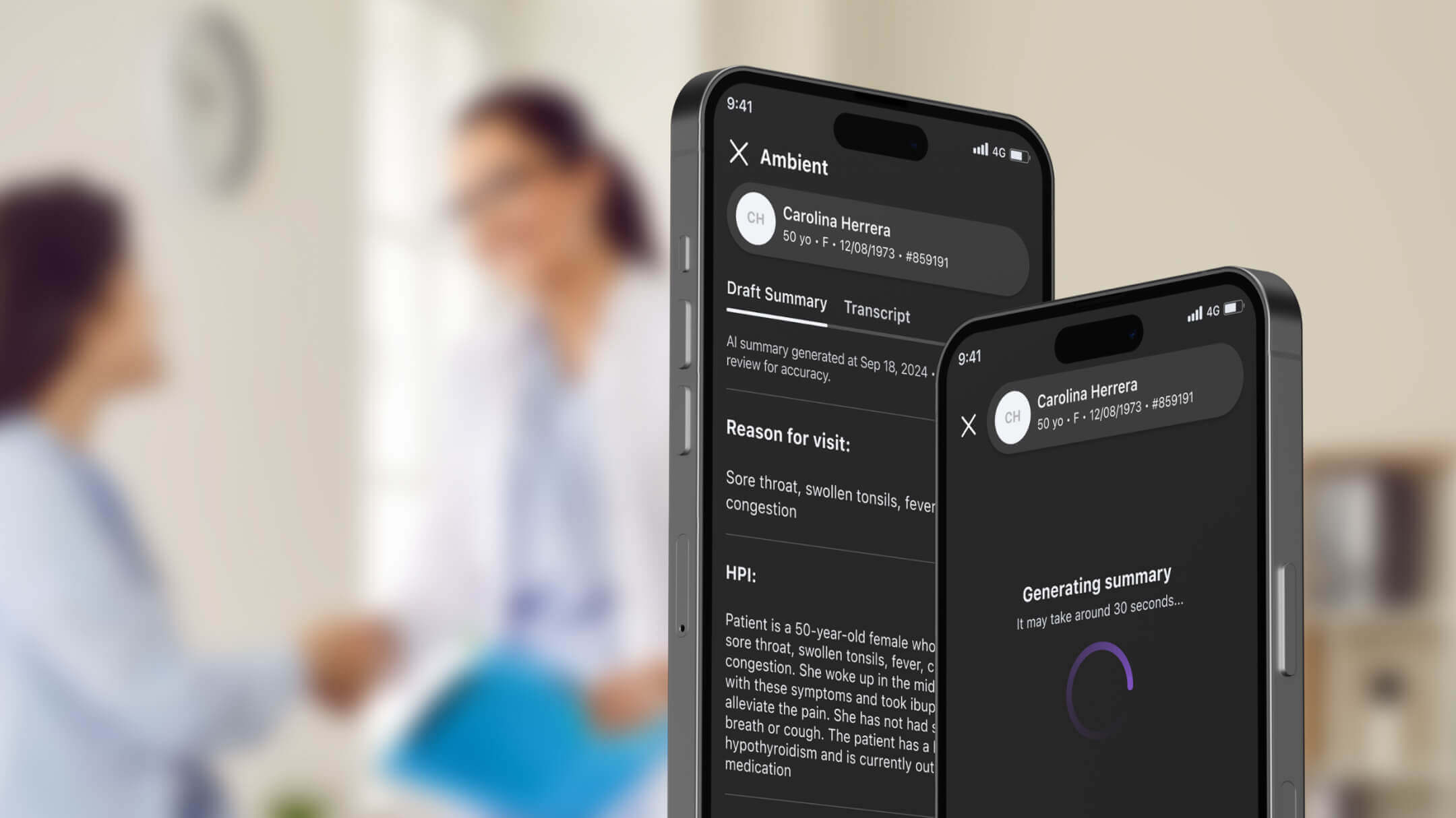
Concerns about clinician wellbeing have been on the rise throughout the last decade. I’ve witnessed it firsthand and felt it myself. But the situation isn’t improving at the needed pace, according to athenahealth’s third Physician Sentiment Survey (PSS) conducted by The Harris Poll to examine the factors impacting physicians’ experiences. The survey of more than 1,000 physicians revealed pervasive feelings of burnout and dissatisfaction.
The survey’s findings reveal just how significant the problem is. A record 93% of surveyed physicians say they feel burned out on a regular basis, 49% say their workload has become unsustainable, and only 38% say they believe their practice is on solid financial footing.1 From my own experience as a physician, and from working every day to help physicians operate their practices efficiently, I’m not surprised that more than half of those surveyed say they have considered no longer seeing patients or leaving the medical field altogether.
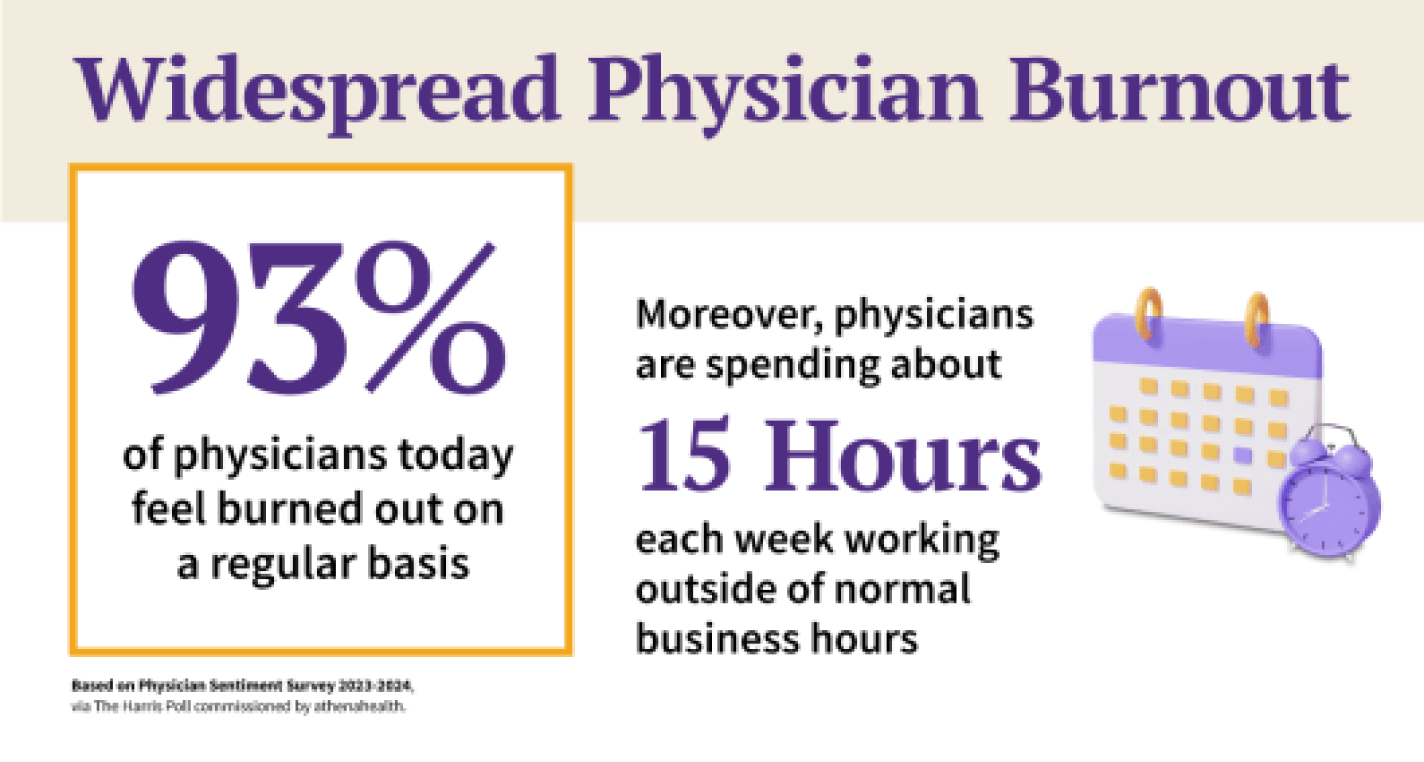
To say that this is simply “concerning” completely undersells the magnitude of the problem, and the potential dangers it represents.
Physicians, and the clinical teams they work with, are the lifeblood of the American healthcare system. But despite working so hard for so long to keep things going, many of us are tired of fighting in the face of overwhelming bureaucracy, constant regulatory changes, and increasingly complex payer requirements. In fact, 64% of physicians surveyed say they are overwhelmed by administrative requirements and burdens, and 91% say the burden of regulatory requirements is getting worse.2
It doesn’t have to be this way. So, what can we do – and what are we at athenahealth already doing – to address this urgent and existential challenge?
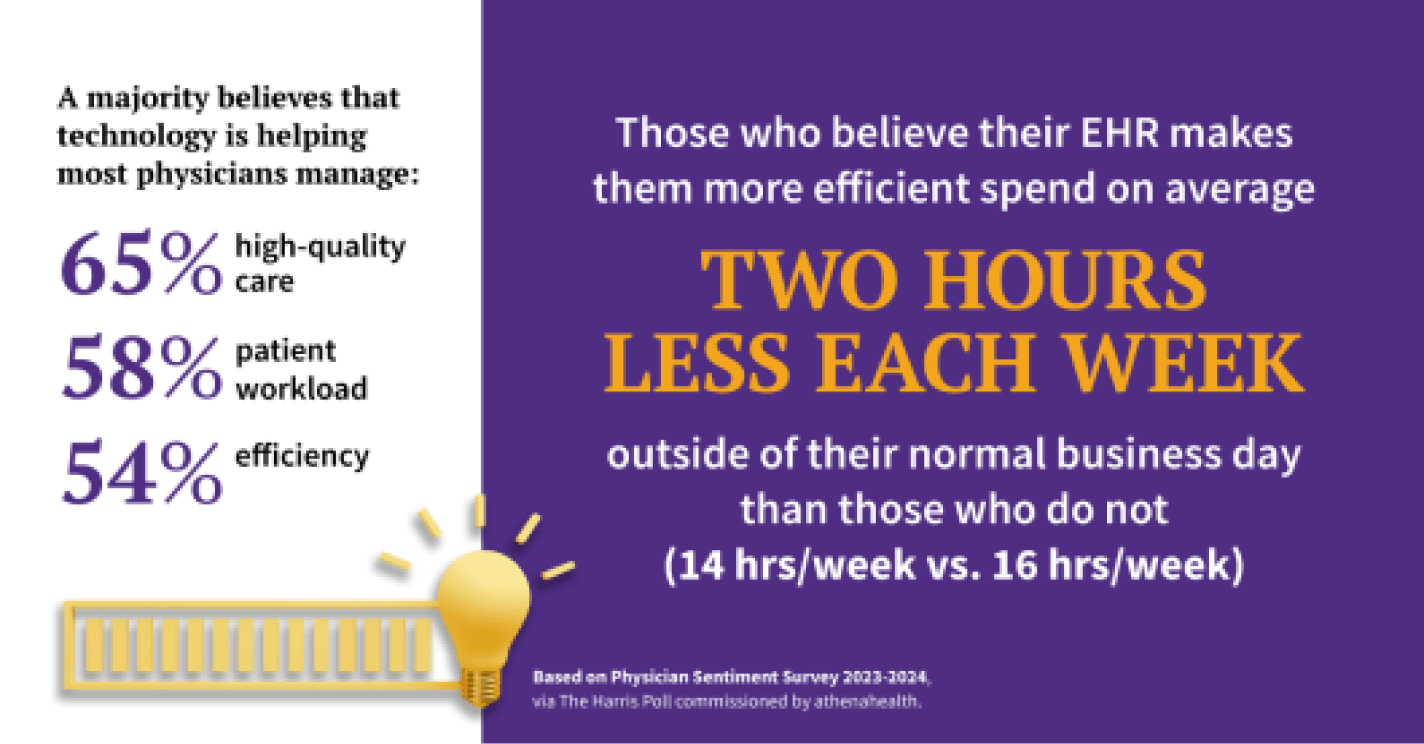
Opportunities for technology to live up to its promise
For all the blame that healthcare technology has received there’s also significant cause for optimism. The right technology – the type that delivers the right information at the moment of care while simplifying the practice of medicine and removing administrative work – can be the difference between barely surviving as a practice, and thriving as a doctor.
In certain cases, practice management technology like billing systems, electronic health records, and patient communication systems are already meeting this challenge. It’s exactly the type of tech that we are designing at athenahealth and delivering to our practices every day. I believe that well-designed technology can not only alleviate some of these burdens but be a source of delight and empowerment for patients, clinicians, and staff.
While the majority of physicians we surveyed credit their EHR with helping them provide high-quality care (65%) and improve their efficiency (54%), many physicians also feel so overloaded with information that it increases their stress level (63%).3 That’s a failure of some of the current technology in use today to adequately filter through the noise and present only the most important, relevant information. And it’s also a massive opportunity.
Physicians are also overwhelmed by excessive patient communications — 60% say they are expected to be available “all hours of the day, every day of the week.”4 While I personally understand the desire of patients, that simply isn’t sustainable. We all want to meet patients where they are and communicate in ways that work for our patients, but it can’t be at the expense of our own health and wellbeing as physicians. It’s also true that the right technology is already helping us strike the right balance between availability and burnout.
While we aren’t there yet, I feel optimistic that a better, simpler future is in sight. Technology and AI, from machine learning to deep learning to generative AI, have shown the potential to deliver value to clinicians by automating routine tasks, streamlining critical workflows, and relieving the administrative burden.
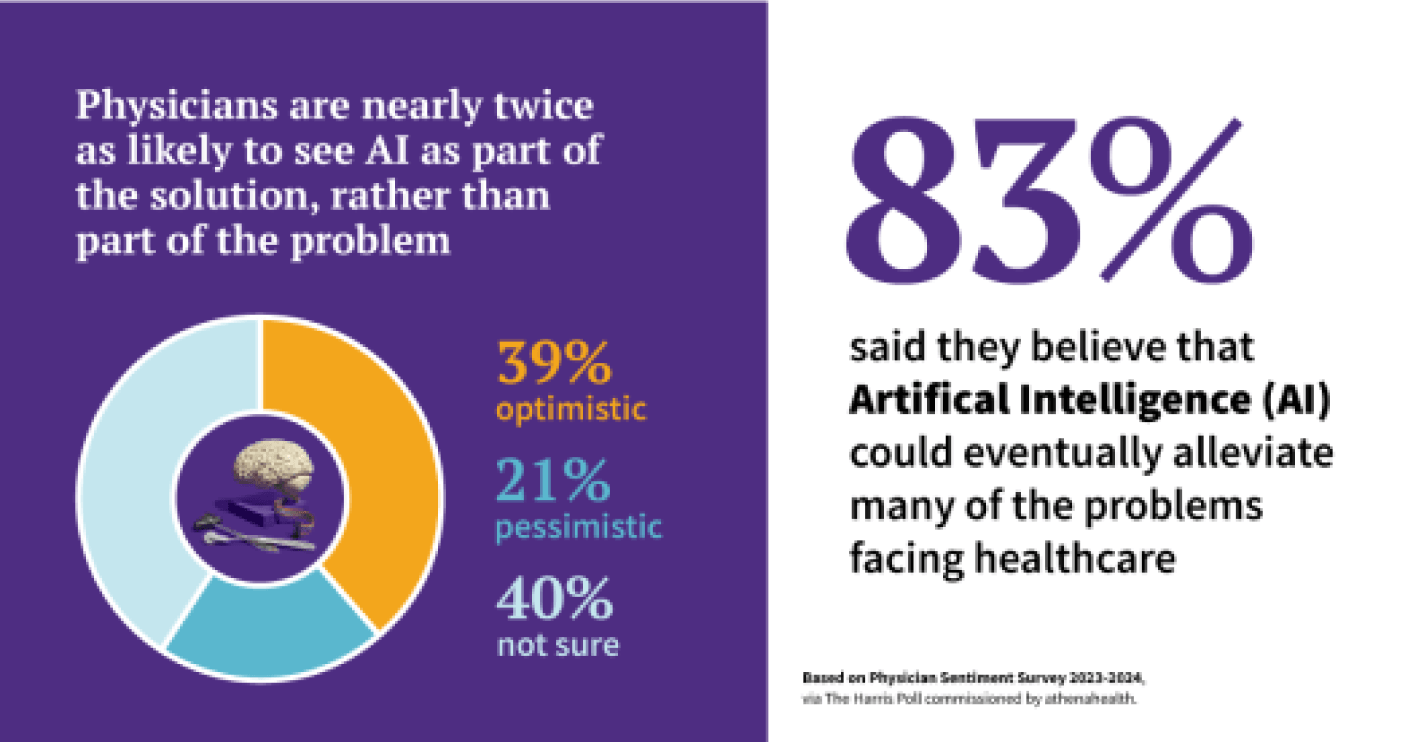
How AI can help address the causes of physician burnout
The PSS found that when it comes to AI, 60% of physicians are concerned about the loss of human touch in healthcare.5 Instead of taking away from patient encounters, we need AI healthcare technology to take on administrative work and increase efficiencies so physicians can have more facetime with patients.
As AI models become more and more refined, their ability to take over administrative processes will make everything from coding to payment processing faster and easier. These advancements will be especially transformational for smaller practices, where resources are constrained and every minute and every dollar counts. This is already happening across the athenahealth platform, easing burdens on both physicians and administrative staff.
We will start to see efficiencies in patient communications as well, with this latest generation of AI (generative AI) creating first drafts of responses to some patient questions, which care teams can then edit and send. And most technology companies — athenahealth included — are working hard on tools like ambient listening, so the bulk of documentation work is automatically done for the clinician as they talk to the patient. This would mean the physician only has to review the notes and sign off on them, rather than generating them from scratch.
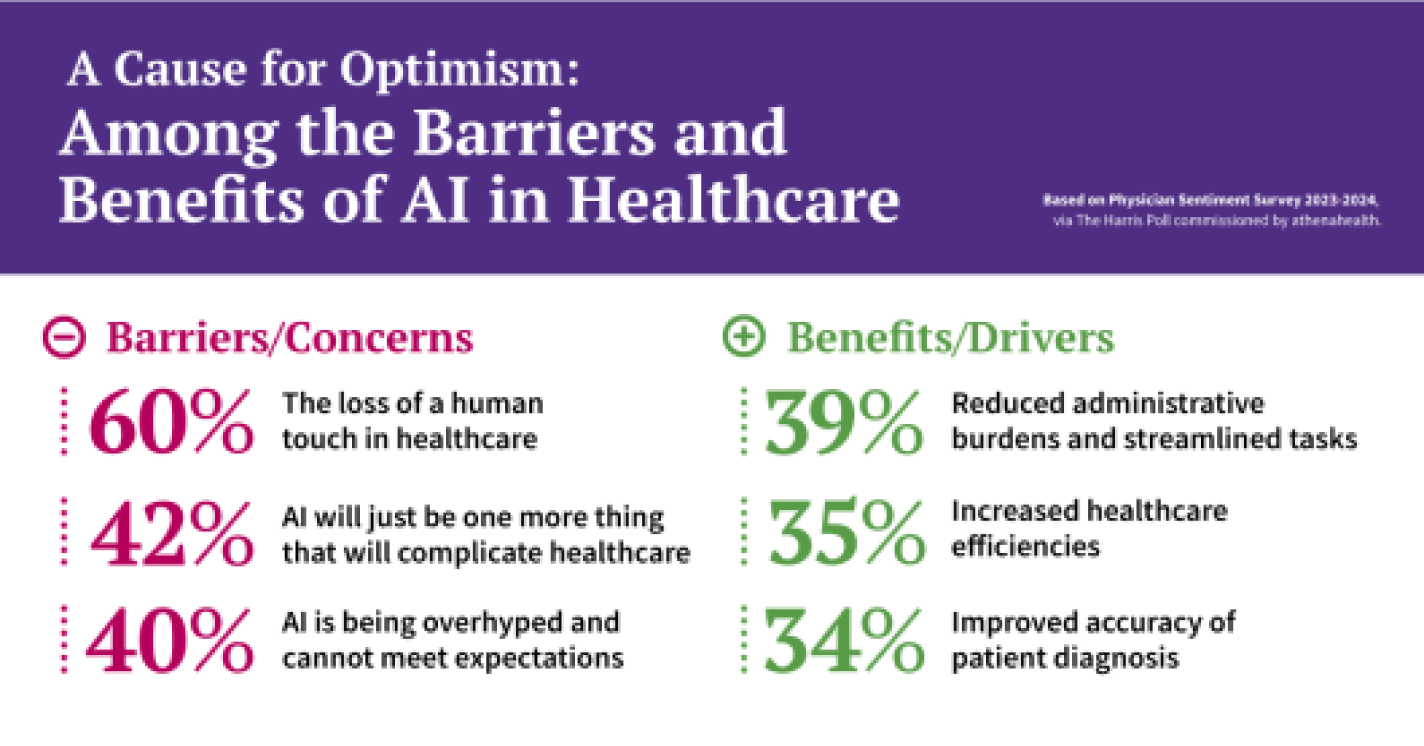
Can AI create a more optimistic future for healthcare?
Physician attitudes for the integration of AI in healthcare vary widely. 21% of survey respondents said they are pessimistic about the future of AI in healthcare, 39% were optimistic, and another 41% aren’t yet sure.6 Those AI optimists see other things to be hopeful about, too: they’re more confident that healthcare is heading in the right direction, and they’re more confident that they have the tools they need to focus on patient care.
So, I’m choosing the optimist camp, but not without careful consideration. We have to move with care and deliberation, especially as AI begins to touch core patient-facing work. Patient safety is of the utmost importance and will always trump speed of adoption. And keeping a strong emphasis on safety may also help win over the 41% of physicians who aren’t sure about the future of AI in healthcare.
This is an existential moment for the practice of medicine, and we all need to work together to resolve the underlying complexities that make physicians want to leave the field. That perspective is what drives our product development at athenahealth. When technology is designed to truly address the barriers between physicians and patients – to actually enable clinicians and elevate the practice of medicine instead of its administration – we cure the complexity, and make life better for practices and patients alike.
Nele Jessel, M.D., is chief medical officer at athenahealth.
1. 2023 Physician Sentiment Survey, commissioned by athenahealth and fielded by Harris Poll, Jan 2024.
2. Ibid
3. Ibid
4. Ibid
5. Ibid
6. Ibid
